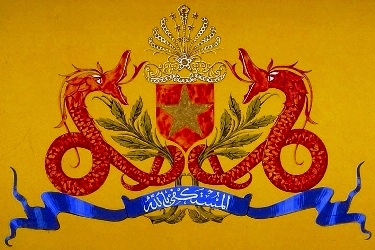LANGKAT

BRIEF HISTORY
The Royal house served as representatives or local rulers on behalf of the Sultan of Aceh until the early years of the nineteenth century. The arrival of the Europeans during the teens and twenties, and the weakening of Acehnese power in their wake, prompting the Rajas of Langkat to seek to establish their own independence. They threw in their lot with, and accepted the protection of the Sultans of Siak, then the dominant power on the east coast of Sumatra. However, the Acehnese returned during the 1850's and attempted to regain control. The granting of grandiose titles to the local rulers and an administrative presence stemmed the tide for a period. Eventually, Acehnese power was no match for the Europeans. Langkat concluded a separate contract with the Dutch in 1869. They went one better than the Acehnese and recognised the Raja as Sultan in 1887.
The potential for developing the plantation economy was a great temptation to the Dutch and the prospect of income from leases, too great for the Raja. Musa al-Khalidy, assumed the title of Sultan and a reign name to signifying his complete equality with his former overlord. In common with Deli, Asahan and Siak, the sultanate prospered beyond expectation. Rubber demand boomed during the Great War and the ever-growing demand for oil followed during the 1920's and 30's. By the early 1930's the Sultan of Langkat was the wealthiest ruler in Sumatra, thanks to oil royalties from the Pengkalan Brandan fields. All this only served to enhance the envy of the Japanese.
The Second World War soon displaced prosperity as Japanese oppression displaced Dutch colonialism. The end of war, however, did not bring an easy peace. The Communist inspired "social revolution" of 1946 brought hideous bloodshed and loss of life. Amongst the casualties, Tengku Amir Hamzah, scion of the Langkat Royal House and the foremost Malay poet and writer of his generation. The evils of the times did not end quickly as the Dutch attempted to regain control while the Javanese republicans attempted to oust them. Large numbers of the aristocracy perished in these conflicts, chaos reigned supreme and the sultanates all but ceased to function. The reigning Sultan, Mahmud 'Abdu'l Jalil, died in 1948, one year before the conclusion of hostilities and the recognition of independence by the Dutch. His son was not proclaimed or installed as Sultan.
In common with the Royal House of Deli, the Langkat family was independently wealthy due to the land lease system and the successful oil economy. It opened them to greater intercourse with the wider world, to travel broadly and to value European education. It also enabled them to conclude several marriage alliances across the Straits of Malacca.
Although the central government in Java was very slow in officially recognising or promoting the restoration of the Sumatran princes, a recent change of policy has been implemented without much publicity. The Langkat dynasty has been one of the few to benefit. They accepted a Head of the Royal House, in the person of Tengku Dr Herman Shah Kamil in 1999. Since his death in 2001, his nephew has been officially installed as Sultan Iskandar Hilali 'Abdu'l Jalil Rahmad Shah.
STYLES & TITLES:
The ruling prince: Sri Paduka Tuanku Sultan (reign name) ibnu al-Marhum (father's title and reign name), Sultan of Langkat, with the style of His Highness.
The principal Royal consort of the ruling prince: Tengku Permaisuri, with the style of Her Highness.
The Heir Apparent: Raja Muda.
The sons, grandsons and other male descendants in the male line, up to the fifth generation: Tengku (personal name) bin (father's name and titles).
The daughters, granddaughters and other female descendants in the male line, up to the fifth generation: Tengku (personal name) binti (father's name and titles).
RULES OF SUCCESSION:
Male primogeniture, the sons of Royal wives taking precedence over those of commoners.
ORDERS & DECORATIONS:
Sultan Mahmud ‘Abdu’l Jalil Rahmad Shah Medal: instituted between 1927 and 1946, no details.

Sultan Mahmud Medal in silver - obverse.
See under Malaysia main page.
SOURCES:
John Anderson, Mission to the East Coast of Sumatra in 1823. Oxford in Asia Historical Reprints. Oxford University Press, Kuala Lumpur, 1971.
M. Hamerster, "Bijdrage tot de kennis van de afdeeling Asahan", Uitgave van het Oostkust van Sumatra-Instituut, Mededeeling No. 13, Amsterdam, 1926.
Dada Meuraxa, Sejarah Kebudayaan Suku-Suku di Sumatera Utara. Sasterawan, Medan, 1973.
Oostkust van Sumatra-Instituut : kroniek, 1925 to 1940, 1941-1946, & 1948 en 1949. Oostkust van Sumatra Instituut, Amsterdam, 1926-1950.
SPECIAL ACKNOWLEDGEMENTS:
H.H. Sri Paduka Tuanku Sultan Iskandar Hilali 'Abdu'l Jalil Rahmad Shah al-Haj, the Sultan of Langkat.
Ir. Haji Abdul Hamid Arsyad, Datuk Amar di-Raja, Langkat
The late Jeffrey Finestone, Thailand.
Theo Dirk Brouwer, Canada.
Stephen Bunford, UK.
Y.M. Tengku Zohoriah Haneth, Langkat.
Y.M. Tengku Dr. Haji Nathan Mahmud, Jakarta.
Y.M. Tengku Meliana. Vena Siregar.
D. Tick, Pusat Dokumentasi Kerajaan-Kerajaan di Indonesia "Pusaka".
Copyright© Christopher Buyers, December 2001 - May 2013